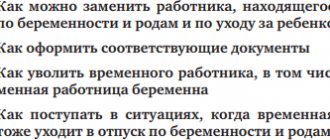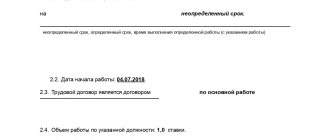When a change in the scope of duties entails a change in salary, can an adjustment to the job description indicate a change in the job function and what should be remembered when notifying an employee of an upcoming dismissal: the answers to these questions are in the article.
Doing business often requires a review of certain working conditions in the company. If employees understand the need for innovation, then, as a rule, no problems arise: any provision of the employment contract can be changed by agreement of the parties. For refusal to work under new conditions, management has the right to dismiss an employee on its own initiative. Note that quite often such grounds for dismissal are used when an employee has “immunity” from dismissal at the initiative of the employer, and the company wants to part with him. But in case of a dispute, the employer will have to:
- prove that it was impossible to maintain the terms of the employment contract in their original form;
- provide evidence that these changes occurred due to organizational or technological reasons.
In addition, it is important to remember that any innovations should not affect the employee’s work function. After all, its change is possible only by mutual agreement of the parties. At the same time, in some cases, changing an employee’s job functions at the initiative of the employer is possible.
Let's consider cases when management has the right to adjust an employee's job responsibilities or reduce their volume, and, as a consequence, the official salary.
The salary reduction must be caused by organizational or technological reasons
Unlike staff reduction (when the employer is not required to prove the expediency of abolishing a particular unit), changing the terms of the employment contract must be justified by specific reasons. In the event of a legal dispute, it is the employer who will have to prove that he did not have the opportunity to maintain the working conditions as they were (clause 21 of the Resolution of the Plenum of the Supreme Court of the Russian Federation dated March 17, 2004 N 2).
The law specifies only two reasons for changing the terms of an employment contract at the initiative of the employer: organizational or technological changes.
The following may be recognized as organizational:
- changes in the company's management structure;
- internal restructuring of the enterprise with redistribution of the load among departments or specific positions and, as a result, replacement of the remuneration system.
Technological changes may include:
- introduction of new production technologies, machines, units, mechanisms;
- improvement of workplaces;
- development of new types of products, etc.
Thus, the company cannot justify changing the terms of the employment contract on reasons such as financial difficulties, since this would be contrary to the Labor Code of the Russian Federation. It should also be remembered that the introduced changes should not worsen the employee’s position in comparison with the terms of the collective agreement (Part 8 of Article 74 of the Labor Code of the Russian Federation). For example, if a collective agreement establishes the minimum level of wages for employees of an enterprise, then the salary under new working conditions cannot be less than that established by the collective agreement.
It is important for the employer to prove that it is precisely because of the changes being introduced that the terms of the employment contract should be revised. The absence of adequate evidence of the validity of the changes will indicate that changes to employment contracts and subsequent dismissal due to disagreement with changes in working conditions at the initiative of management are illegal. Whereas the presence of such evidence will confirm the company is right.
Why do they write orders?
There are several situations in which issuing an order is a necessary measure. The same applies to the need to familiarize yourself with the document with some other employees. Here are just a few relevant circumstances:
- When the internal routine changes.
- Application of disciplinary sanctions of any kind.
- For external transfers to other employers.
- Internal transfers to other workplaces.
- Involvement in overtime types of obligations.
- Dismissal of subordinates, regardless of the reason.
- Determining the order in which vacations are granted.
The familiarization procedure becomes a familiar and quick affair if a familiar environment develops at the enterprise. Special meetings are held or documents are provided on an individual basis. Difficulties arise for companies if there is a conflict of interest.
How to change the structural unit indicated in the employment contract with an employee
In practice, the organization has the right to abolish the department or other structural unit in which the employee worked, transferring his functions to another department or department or distributing them among several departments. An employee of a liquidated department can be assigned to a new department or division, which is assigned the functions previously performed by this employee. However, changing an employee’s job function at the initiative of the employer is unlawful.
Judicial practice: the question of who owns the initiative to dismiss
Thus, in one case, in connection with the reorganization of the bank, the management decided to transform the investor relations department into two departments: information and analytical and public relations. The employee, who headed this department before disbandment, was notified of changes to the contract concluded with her and was offered to take the position of head of the information and analytical department with a changed salary due to a decrease in the scope of duties. The employee did not agree with this proposal and stated that as a result of the dissolution of the department she led, her job function was changed, and the employer had no right to carry out such a transfer on its own initiative and without her consent.
The courts of first and cassation instances sided with the employer. However, the supervisory authority of the Moscow City Court supported the worker. Subsequently, the Presidium of the Supreme Court of the Russian Federation issued a resolution, according to which the dismissal of the employee was recognized as legal. The court concluded that as a result of the dissolution of the department and in accordance with the instructions for the employee’s new position, her job responsibilities were not changed, and the new position corresponded to her specialty and qualifications. The employee refused the offered position, which cannot be qualified as dismissal at the initiative of the employer (Resolution of the Presidium of the Supreme Court of the Russian Federation dated 06/08/2011 N 12ПВ11).
Compilation rules
When filling out, it is fundamentally important to take into account the timing. The more accurately the time is specified, the better. In court, questions will be asked regarding time periods and testimony will be compared. It is also advisable to mention in the text where the order was read (office, HR office, manager’s office, etc.).
It is acceptable to ask the question orally or read the document out loud to the employee. The main thing is that the refusal is clear. The text of the act may sound like this:
“I, the head of the HR department, Vasily Ivanovich Tarasov, in the presence of the cleaner Elena Vitalievna Markova and the manager Ivan Sergeevich Knyazev, have drawn up this act stating that...”
Employees or persons who agreed to record the fact of refusal must also be present in this room and clearly understand that the employee refused to read the order and sign on it. Witnesses must sign to confirm this fact. Only in this case will the act have legal force. If the employee refused to sign this document, then this can be written at the very end of the act. There is no need to draw up a separate document regarding refusal to sign.
The employer has the right to change the employee’s duties without changing the job function
The employer, taking into account his production needs when carrying out a structural reorganization, has the right, without affecting the essence of the employee’s labor function, to add to him any functional job responsibilities with a simultaneous reduction, or without it, of his existing job responsibilities. As can be seen from the materials of judicial practice, a change in the scope of job responsibilities for a specific position is not a change in the labor function at the initiative of the employer (Determination of the Moscow City Court dated November 14, 2011 in case No. 4g/4-9268). Article 74 of the Labor Code of the Russian Federation provides that changes in the terms of an employment contract due to changes in organizational or technological working conditions do not affect the employee’s labor function, which must remain unchanged. Under the labor function, according to Art. 15 of the Labor Code of the Russian Federation, is understood as work in a position in accordance with:
- staffing schedule;
- profession, specialty indicating qualifications;
- the specific type of work assigned to the employee.
Thus, in practice, the employer has the right to abolish the department or other structural unit in which the employee worked, transferring its functions to another department or department or distributing them among several departments. The employer can assign an employee of a liquidated department to a new department or division, which is entrusted with the functions previously performed by this specialist. However, the employer does not have the right to change the employee’s job function itself. If, for example, a person works in one specialty, the employer cannot, in accordance with Art. 74 of the Labor Code of the Russian Federation to offer him a job in another specialty. However, if the employee agrees, then there are no obstacles to this (Article 72 of the Labor Code of the Russian Federation). At the same time, the employer may have an objective need to change some of the specialist’s responsibilities without affecting the essence of his job function. For example, this may be due to the introduction of new production technologies, measures to improve organization and increase labor efficiency, etc.
A natural question arises: can an employer change an employee’s duties if this does not affect the essence of his job function? This question should be answered positively. As indicated in paragraph 4 of the Qualification Directory of Positions of Managers, Specialists and Other Employees (approved by Resolution of the Ministry of Labor of the Russian Federation of August 21, 1998 N 37), in some cases it is possible to expand the range of responsibilities of employees in comparison with those established by the corresponding characteristics. In these cases, without changing the job title, the employee may be entrusted with the performance of duties provided for by the characteristics of other positions that are similar in content of work, equal in complexity, the implementation of which does not require another specialty and qualifications.
Thus, a change by the employer in the employee’s job responsibilities is not a change in his labor function in the sense of the provisions of Art. , Art. 72 Labor Code of the Russian Federation. It must be borne in mind that if the employer does not carry out a structural reorganization, but he simply needs to change the job responsibilities of a particular employee or group of employees, adding or adjusting existing responsibilities, it is enough for him to issue a new job description. That is, changing the job description at the initiative of the employer is permissible. The inconsistency of certain provisions of the Labor Code of the Russian Federation allows the company to abuse its rights when making personnel decisions.
Violation of the procedure for introducing changes entails their cancellation in court
Even with very real reasons for changing the employment contract, dismissal due to refusal to continue working under new conditions may be considered illegal due to the employer’s failure to comply with the dismissal procedure. Therefore, it is very important to pay attention to the nuances of dismissal if an employee refuses to work under changed conditions.
1. First of all, the employer decides to change the terms of the employment contract with a specific employee or group of employees. It is formalized by an order or direction of the company signed by the general director or another person whose competence includes making such decisions.
2. Based on this order, the personnel service prepares a notification to the employee about upcoming changes to the terms of the employment contract determined by the parties. The employee must be notified no later than two months in advance (Part 2 of Article 74 of the Labor Code of the Russian Federation). For an employer who is an individual, this period is two weeks (Article 306 of the Labor Code of the Russian Federation).
3. The employee must be familiarized with the notification against signature. Let us note once again that it should contain information not only about the nature of the changes, but also about their reasons. It is advisable to set a period in the notice during which the employee needs to make his decision about working under the new conditions.
Often in practice the question arises about the start time of the two-month period. The problem is that it is unclear from what date this period begins to be calculated - from the day the employee is given the notice or the next day after its receipt. We believe that Art. 14 of the Labor Code of the Russian Federation, according to which the period begins the next day after the calendar date that determines the occurrence of a legally significant event.
If the employee does not agree to work under the new conditions, the employer in writing offers him another vacant position or work that corresponds to the employee’s qualifications, or a vacant lower position or lower-paid work that he can perform taking into account his state of health (Part 3 of Article 74 Labor Code of the Russian Federation). In this case, the employer should offer all available vacancies in the area during the entire two-month notice period. Written proposals must indicate not only the names of positions, but also working conditions, wages, as well as other mandatory conditions provided for in Art. 57 of the Labor Code of the Russian Federation. Otherwise, the procedure may be considered to have been carried out in violation.
Additional rules for the procedure
One of the first steps when employees refuse to familiarize themselves with documents is to assemble special commissions, whose employees are informed about the current situation. The best option is for at least one of the following to be present on this commission:
- an ordinary employee;
- personnel officer;
- lawyer.
After this, a commission is assembled and an employee is invited. They show the order and ask you to sign as proof of familiarization.
Even if the other side continues to refuse, its position becomes more vulnerable. Witnesses appear who can confirm that the information has been communicated to the other party. At the next stage, the act itself is drawn up.
How to correctly change an employee's job description
Changes to the job description may be associated with changes in the terms of the employment contract. In this case, the requirements for advance written notification of this to the employee must be met. And only after the employee has agreed to continue the employment relationship, the job description changes:
- if the instruction is an annex to the employment contract, it is advisable to simultaneously make changes to the employment contract and job description by preparing an additional agreement;
- if the job description was approved as a separate document and changes to it do not entail the need to change the terms of the employment contract, it is most convenient to approve the job description in the new edition by familiarizing the employee with it in writing (letter of Rostrud dated October 31, 2007 No. 4412-b ).
The absence of vacant positions or the employee’s refusal of an offered job may serve as grounds for termination of the employment contract in accordance with clause 7 of Part 1 of Art. 77 Labor Code of the Russian Federation. In this case, there is no need to obtain a reasoned opinion from a representative body of employees. When dismissing employees on this basis, the employer must pay them, in addition to the final payment and compensation for unused vacation, severance pay in the amount of two weeks' average earnings (Part 3 of Article 178 of the Labor Code of the Russian Federation).
If organizational or technological changes may lead to massive layoffs, Art. 74 of the Labor Code of the Russian Federation gives the employer the right to unilaterally introduce a part-time working regime. When introducing such a regime, the opinion of the trade union must be taken into account. Criteria for mass layoffs are set by industry agreements and generally depend on the timing of the release of workers and the percentage of the total number of workers.
It is important to take into account that Art. 74 of the Labor Code of the Russian Federation provides for the right, and not the obligation, of the employer to dismiss under clause 7 of part 1 of art. 77 of the Labor Code of the Russian Federation for an employee who does not agree to work in new, changed conditions. Even if a specialist does not agree to work under new conditions, the employer has the right to keep him at work. However, this employee must work under the same conditions, and the employer is obliged to provide such working conditions.
Consequences of signing
Refusal to sign will result in the following consequences:
- Refusal will not be an obstacle to the implementation of the manager’s order if the latter draws up the act correctly.
- Refusal may be considered as disagreement with management's order. That is, this is a violation of labor discipline. This is relevant for cases where an employee is asked to sign orders for a business trip or to undergo a medical examination. In this case, disciplinary punishment follows.
The consequences of the situation in question depend almost entirely on the actions of the employer. Therefore, he must be guided by the law. This will help prevent future litigation.
The procedure for dismissing an employee due to refusal to continue working under changed conditions
| Employer's actions | What to pay special attention to |
| Issue an order to introduce changes to organizational or technological working conditions | It is important that the changes introduced do not affect the employee’s job function. If the organization has a collective agreement, the new conditions should not worsen the employee’s position compared to the collective agreement |
| Notify employees about changes in working conditions | It is necessary to notify employees 2 months before the introduction of changes (for individual entrepreneurs - 2 weeks). The notice must be in writing and delivered against signature. The notice must indicate the date of changes, their reasons, a description of the new terms of the employment contract, including all essential conditions: job responsibilities, work schedule, wage level, etc. |
| Offer all available vacancies in the organization if an employee refuses to work under changed conditions | The proposal must indicate not only the names of the proposed positions, but also working conditions, salary, as well as other mandatory conditions provided for by the Labor Code of the Russian Federation. Please note that if the employee agrees to fill any of the proposed positions, the employer does not have the right to conduct an interview or set a probationary period |
| If the employee agrees to change the terms of the employment contract | |
| Conclude an additional agreement to the employment contract | If the employee agrees to continue working under the changed conditions, the employer enters into an additional agreement with him. It must indicate a description of the new conditions, the time of entry into force of the additional agreement, but not earlier than 2 months from the date of notification |
| If the employee does not agree to change the terms of the employment contract, but agrees to the transfer | |
| Transfer an employee to another position | If an employee refuses to continue working in his previous position under changed conditions and agrees to fill another vacant position, the employer issues an order for the transfer of such a specialist and enters into an agreement for his transfer indicating the new position and other mandatory conditions |
| If the employee does not agree to either a change in conditions or a transfer | |
| Carry out dismissal under clause 7, part 1, art. Art. 77 Labor Code of the Russian Federation | If the employee does not agree to work under the changed conditions, after 2 months the employer has the right to terminate the employment contract with him. The wording of dismissal must be indicated in accordance with clause 7, part 1, art. 77 Labor Code of the Russian Federation |
| Pay severance pay | In case of dismissal of an employee, the employer must pay him severance pay in the amount of two weeks’ average earnings (Article 178 of the Labor Code of the Russian Federation) |
Source: https://ppt.ru
To read about all controversial situations, type “Employee does not agree to change working conditions” in the quick search bar Controversial situations during dismissal due to the employee’s refusal to change the terms of the employment contract
Document in online version
Time limits for familiarization according to the Labor Code of the Russian Federation
According to existing legislation, the act must be stored in the organization (its archives department, safe, etc.) for three years. This is the case if employees do not work in hazardous conditions.
We suggest you read: How many years before retirement can you fire an employee?
Labor legislation does not establish a single and specific rule for the time period within which an order to dismiss an employee must be familiarized with.
But it affirms the employer’s obligation to issue a full paycheck and work book to the employee on the day of immediate dismissal.
To avoid problems, employers try to inform the resigning person in advance. But even a signature placed on the day of settlement will not be considered a violation of the law.






